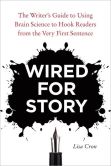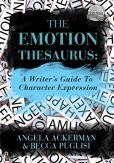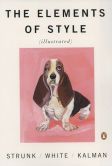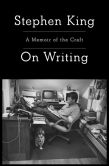Wired for Story by Lisa Cron - I love, love, love this one, and it flies against every writing principle I hold dear. It speaks little of the beauty of writing and rather focuses on plot and the psychological impact your story can make on the human psyche. Essentially what does our brain crave when we read a book? Cron culls both film and literary examples, and I can't tell you how many lines I underlined of both her original thought and extensive psychological research that ties in perfectly with the writing process. There's also a neat section at the end of each chapter prompting you to ask very direct questions about your own work. I can't recommend this enough, especially since it's a short read. I managed to get through in about three days.

The Emotion Thesaurus: A Writer's Guide to Character Expression by Angela Ackerman and Becca Puglisi - More of a reference than a read, every writer needs this book. No matter how skilled you are, you probably defer to a pout or a lip quiver for certain emotions, and this little guy provides pages of actions that help us show rather than tell in unusual ways. Quite easy to navigate and very straightforward.

The Elements of Style Illustrated by William Strunk and E. B. White - I hate grammar. There, I've said it, and I half expect the English teacher police to drag me out to the back yard and beat me (or at least take my teacher's card away). This is not to say I don't respect the heck out of grammar. I love syntax, I love playing with words, I love splitting infinitives with purpose. But I also hate the fact that not all of my mistakes are stylistic choices. Sometimes I flub, and those mistakes bug me later on or worse yet, sometimes I don't catch them at all and feel like a ninny when someone else points them out. I mean yeesh, I'm an English teacher. Don't I know them all? Nope. And this is the seminal text on not all, but certainly the most important rules and more importantly how they affect your writing. Another that can be used as a reference or read cover to cover. There is a non-illustrated version as well, but seriously, LOOK at that cute dog on the cover. Get this one.

Negotiating with the Dead: A Writer on Writing by Margaret Atwood - Margaret Atwood is brilliant. Period. Her fiction and poetry are sharp, her essays insightful. And I love how creepy these two appear on the cover. I bought this book at least five or ten years ago, and I finally got around to reading it. A BIG WARNING HERE! This is not a how-to write book. Rather this is a highly intellectual look at her process. That being said it feels like sitting down with her and peeking inside her brain, sort of a Being Margaret Atwood if you will. It's not an easy read, and there are parts that drag. But it's worth it. The book will challenge your brain and make you question your own process. It might be complimentary to read this with one of her fiction books as well (Oryx and Crake).

On Writing by Stephen King - On the flip side, I'm not a Stephen King fan. I've read the classics and was never compelled, except maybe by It that just scared the living daylights out of me. I find King formulaic. But this book IS a how-to write masterpiece. And it's worth a dozen reads. Conservatively this past year was my sixth, maybe seventh journey through, spurred by one of my students reading it. And I am never disappointed. Half of the book is King's life replete with a detailed account of his love of reading. In my mind he is an ideal model of a writer, who clearly states over and over "If you don't have the time to read, you don't have the time or tools to write." Never has there been a truer statement about writing. I see too many writing students who insist on being writers when they either don't enjoy reading or refuse to make the time to read anything of quality. And quality doesn't equal classic. I learned plenty from the Sweet Valley High series when I was a teen. The second half of the book is King's advice on how to write, and while his novels aren't my cup of tea, the man's a very, very good writer. Pick this up and make it part of your yearly writer renewal. You'll be glad you did.

A few of these I'd not heard of. Thanks for pointing them out. Especially loved On Writing -- the rather dry wit element, perhaps.
ReplyDeleteI think really good writing books are few and far between. Thanks for reading my blog!
ReplyDelete